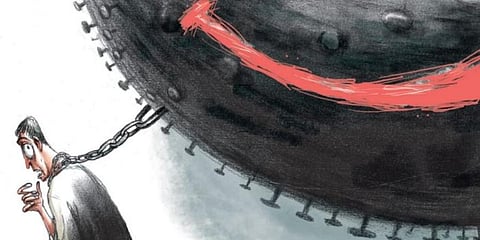

Life in India during the pandemic presents an unprecedented tale of anxiety, uncertainty and deprivation. It could be decoded in different terms such as economic distress, social privation and emotional stress. The common denominator of these diverse manifestations is fear, which marks the national mood. Fear is the emotional antonym of freedom. This cardinal idea was amplified by Tagore long before 1947, when he visualised the heaven of freedom, where the ‘mind is without fear and the head is held high’. Unfortunately, today there is fear in the mind and the heads are bent. Some of these fears have been generated by the pandemic and its attendant socio-economic and psychological fallout, while some are induced by the state. Cumulatively, fear today is a tangible reality. The five major fears that stalk the nation today could be summarised as follows:
Fear of uncertainty: Covid-19 has shaken up all certainties. How long the pandemic would last and what all havoc it would wreak is beyond prediction. The sad saga of uncertainty keeps unfolding without an end in sight. Will the lost jobs ever be redeemed? Will the opportunities and possibilities that once illuminated the skies of young minds ever come back? The economically and socially marginalised and powerless millions stare towards a blank and barren landscape of uncertainty. Fear of uncertainty fills their lives with anxiety and drains willpower and optimism.
Fear of expensive hospitalisation and death: The fear of virus infection is real. It is not the infection per se that causes fear. The probability of prolonged hospitalisation, its trauma, unfortunate complications, the insecurity it generates and the unbearable financial liability it engenders are all real sources of fear. The instances of unbelievable bills of private hospitals are modern-day horror stories in social consciousness.
Fear of insignificance: With increasing income-instability and the consequential powerlessness, wage earners are faced with dried-up resources and the fear of irrelevance. Their chances of finding better jobs or venturing into new activities are badly dented by the current economic stagnation. Besides, the steadily rising cost of living has hollowed out the finances of millions of households. Fear of helplessness and insignificance, with its ramifications on their mental health, is rampant and real.
Fear of shrinking opportunities: The pre-Covid period may not have been an ideal time. But young people could nurture their pet dreams and keep their aspirations high. The freedom to dream kept dejections and disappointments at bay. With mounting uncertainties, the dreams of young people have started wilting. The shrinking educational and employment opportunities are a source of debilitating fear for the youth.
Fear of failure: Cumulatively, these factors have been gnawing at the entrepreneurial confidence of individuals. As the positive factors are dwarfed by overwhelming threats and limitations, fear of failure stares at them. Business ventures that were successful in the pre-Covid times are now confronted with an entirely new set of hostile factors beyond their capabilities to overcome. Establishments that were successful for several years are on the verge of collapse, with income drying up and liabilities mounting. Such stories abound in every city and town, and their number is not insignificant.
What does the state do to allay these fears and instil confidence and hope? Governments may have neither the solutions nor the resources, yet their attitude and conduct matter. At least, the state should not compound the existing fears of its citizens by misplaced policies, hard-hitting actions and stringent legislations. The unmistakable impression created, however, is that of a government that would like to pretend and make others believe that the economic devastation is nothing as grave as projected. Government handouts and tweets tirelessly try to paint the picture of a nation effortlessly bouncing back to normalcy, brushing off the snowflakes on the garment and resuming the journey. This hollow smugness makes people even more vulnerable, cynical and helpless as it conveys the message that their suffering does not matter. The brazen underreporting of deaths on account of the pandemic and the casual stance of the Centre absolving itself of the obligation to pay compensation to the families where the breadwinners died of Covid reiterate this attitude of making light of a grim situation.
Even the alleged use of the Pegasus spyware to snoop on political and business heavyweights, civil servants, police officers, journalists and several others has a bearing on the citizens as it unravels a snide attitude of the establishment. Though most of us may not be snoop-worthy and need not be anxious about our privacy, the Pegasus controversy has, no doubt, thickened the overall fear in the air. Apart from moral issues, it betrays perverted priorities. The death of Stan Swamy in judicial custody, the ever-burgeoning cases booked under a draconian UAPA and sedition charges, and the various stringent and disproportionate actions initiated against legitimate dissent, all fuse in the national consciousness as a psychosis of fear. It is a matter of real concern and sadness that when a nation burdened with multiple fears and unprecedented vulnerabilities looks towards the government for solace, confidence and hope, it is confronted with a fractured polity, hostile politics, misplaced policies and intransigent governance. All these against a looming fear of circumscribed free expression. Only a compassionate state can allay the fears and install freedom, which alone is the trusted antidote to the downward spiral of helplessness and hopelessness. Where freedom is under threat, fear invades.
K Jayakumar
Former Kerala chief secretary and ex-VC, Thunchath Ezhuthachan Malayalam Varsity
(k.jayakumar123@gmail.com)